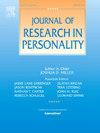"高共鸣反应但低兴趣":马基雅维利主义及其神经结构基础与感知到的社会排斥和职场偏差风险有关
IF 2.6
2区 心理学
Q2 PSYCHOLOGY, SOCIAL
引用次数: 0
摘要
马基雅维利主义特质高分者的操纵、剥削和冷漠行为引起了对其认知和情感移情技能的研究兴趣;然而,研究结果却相互矛盾。我们通过对 202 名全职员工的大样本进行体素形态计量分析,探索了马基雅维利主义的神经结构基质。与我们的预期一致,马基雅维利主义及其神经结构基础与感知到的社会排斥风险之间的关联得到了支持,而与工作场所偏差之间的关联则未得到完全支持;结果仅显示马基雅维利主义与组织偏差之间在特质水平上存在显著关系。我们的研究结果通过强调 "高共情反应但低兴趣 "的观点,即高马基雅维利主义的个体拥有情感共情能力,但他们并不关心他人,从而为马基雅维利主义提供了新的见解。本文章由计算机程序翻译,如有差异,请以英文原文为准。
“High empathic response but low interest”: Machiavellianism and its neurostructural basis relate to perceived risk of social exclusion and workplace deviance
The manipulative, exploitative, and indifferent behavior of individuals with high scores on the trait of Machiavellianism attracts research interest in their cognitive and affective emphathic skills; however, the findings are contradictory. We explored the neurostructural substrates of Machiavellianism using voxel-based morphometry analysis with a large sample of 202 full-time employees. Consistent with our expectation, the association of Machiavellianism and its neurostructural basis with the perceived risk of social exclusion were supported whereas that with workplace deviance were not fully supported; the results only showed a significant relationship between Machiavellianism and organizational deviance at the trait level. Our results together provide novel insights into Machiavellianism by highlighting the perspective of “High empathic response but low interest”; namely, individuals with high Machiavellianism possess affective empathic capacity, but they do not care about others.
求助全文
通过发布文献求助,成功后即可免费获取论文全文。
去求助
来源期刊

Journal of Research in Personality
PSYCHOLOGY, SOCIAL-
CiteScore
5.40
自引率
6.10%
发文量
102
审稿时长
67 days
期刊介绍:
Emphasizing experimental and descriptive research, the Journal of Research in Personality presents articles that examine important issues in the field of personality and in related fields basic to the understanding of personality. The subject matter includes treatments of genetic, physiological, motivational, learning, perceptual, cognitive, and social processes of both normal and abnormal kinds in human and animal subjects. Features: • Papers that present integrated sets of studies that address significant theoretical issues relating to personality. • Theoretical papers and critical reviews of current experimental and methodological interest. • Single, well-designed studies of an innovative nature. • Brief reports, including replication or null result studies of previously reported findings, or a well-designed studies addressing questions of limited scope.
 求助内容:
求助内容: 应助结果提醒方式:
应助结果提醒方式:


